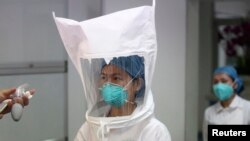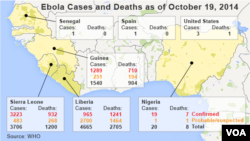The World Health Organization said the fight against Ebola should remain focused on the three West African countries where the outbreak has killed nearly 4,900 people.
After a meeting in Geneva, the WHO Emergency Committee on Ebola said stopping transmission in Guinea, Liberia and Sierra Leone is the most important step for preventing the global spread of the disease.
A committee statement said special attention should be paid to the needs of health care workers, in order to encourage other health care workers to aid in containing the outbreak.
It also said exit screening for the affected countries remains critical and recommended screenings continue at airports, seaports and major land crossings.
In Brussels, the European Union announced it is contributing $31 million for medical research in the fight against Ebola.
Crossing borders
Also Thursday, Keiji Fukuda, the WHO assistant director general, said the organization is "reasonably confident" that countries bordering those hardest hit by the Ebola outbreak are not seeing the virus crossing their borders.
Fukuda said it was unlikely that countries such as Guinea Bissau and Ivory Coast might have cases of the disease crossing their borders without knowing about or reporting them.
“We are reasonably confident right now we are not seeing widespread transmission into neighboring countries,” Fukuda said. “It remains a concern ... (but) right now I think we are not seeing it.”
Fukuda also said it remained very difficult to get sufficient numbers of health workers - both national and international - to help tackle the epidemic, which has killed at least 4,877 people so far this year.
WHO officials plan to brief reporters Thursday after a meeting to review the latest developments in the Ebola outbreak.
The WHO's Emergency Committee on Ebola began its meeting Wednesday, and is considering whether to alter its recommendations for responding to the outbreak.
There have been at least 9,900 confirmed, probable and suspected cases of Ebola, with the vast majority reported in Guinea, Liberia and Sierra Leone.
Vaccines
Also likely to be discussed at a Thursday's meeting in Geneva, drug makers are looking for some kind of indemnity from governments or multilateral agencies against possible losses or claims arising from the widespread emergency use of new Ebola vaccines in Africa.
The issue will likely not delay the industry's work to accelerate production and clinical testing of three experimental vaccines.
The WHO Director-General Margaret Chan will chair the meeting, which includes industry executives, representatives from countries including those affected by Ebola, drug regulators and funders.
GlaxoSmithKline Chief Executive Andrew Witty said a system of indemnity made sense given the unique situation in which companies are being urged by the WHO to fast-track the supply of novel vaccines in a matter of months rather than years.
Witty said indemnity was not a concern for the early phase of testing, when thousands of doses are expected to be given to frontline healthcare workers as part of a clinical trial program in January, but it would be needed when vaccines were rushed into much more widespread use.
Brian Greenwood, a professor of clinical tropical medicine at the London School of Hygiene and Tropical Medicine, agrees that drug companies should not have to shoulder all the risk.
There is currently no proven vaccine against Ebola and drug companies have been wary in the past of investing in the area, since the commercial opportunity is small. Potential losses or claims arising from the use of new vaccines would represent an additional hurdle.
US screening measures
U.S. federal health officials are ordering travelers from those countries to monitor their health for 21 days and give local health departments daily reports on their temperature and whether they have any Ebola symptoms.
The monitoring program will start Monday in six Eastern states - Georgia, Maryland, New Jersey, New York, Pennsylvania and Virginia - where the majority of those travelers would visit.
They will be given an Ebola kit when they arrive at airports, including a thermometer.
Some material for this report came from Reuters.






